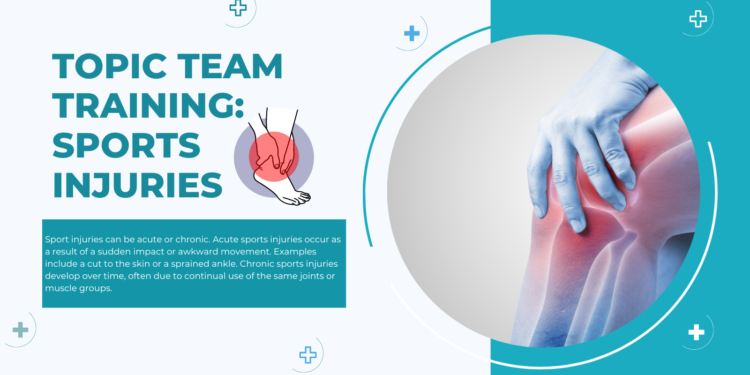A community pharmacy environment that fosters teamwork ensured high levels of consumer satisfaction. This series of articles is designed for you to use as guide to assist your team in focusing on meeting ongoing CPD targets and to identify any training needs in order to keep the knowledge and skills of you and your team up to date.
The below information, considerations and checklist provides support to enable you to run a team training session and identify opportunities for learning within the topic of Sports Injuries. Sport injuries can be acute or chronic. Acute sports injuries occur as a result of a sudden impact or awkward movement. Examples include a cut to the skin or a sprained ankle. Chronic sports injuries develop over time, often due to continual use of the same joints or muscle groups. Chronic sports injuries can occur due to bad technique or occasionally structural abnormalities, such as an inherited bone or muscle problem.
These injuries should be further investigated by a medical professional to determine the cause and to prevent the injury getting worse. Some of the most common sports injuries include: • Sprains, • Strains, • Cuts and bruises, • Bone fractures and breaks, • Tendonitis (inflammation of a tendon), • Blisters, and • Head injuries.
Whilst the figures regarding sports injury presentation to A&E are of note, community pharmacies will collectively see many more minor sports injuries. Common risk factors for sports injury include inadequate warm up, fatigue, over intensive training, unsuitable equipment and a changed environment (e.g. very hot weather, poor lighting, or physical contact with another person or equipment). Use non-steroidal antiinflammatory drugs (NSAIDs) to treat pain, reduce any localised heat, decrease swelling and improve mobility. Oral pain relief normally starts soon after the first dose and the full analgesic effect occurs within a week. Topical NSAIDs can be applied directly to the site of the injury.
Topically applied NSAIDs penetrate the skin and result in therapeutically significant concentrations in underlying inflamed soft tissues, joints and synovial fluid, probably entering the synovial joint mainly via systemic circulation. In tendinopathies (painful tendons), inflammation plays a lesser role and so NSAIDs have little influence on healing but they can help with short-term analgesia. If used in the first seven days in sprains, strains or ligament tears NSAIDs can also be used to limit pain and swelling thus increasing the chances of the patient regaining function and returning to activity sooner. Patients should be advised to take NSAIDs with food. Following that advice, short-term use of NSAIDs is safe but patients should be advised that long-term use increases the risks of systemic side effects (such as gastrointestinal and cardiovascular effects).
Points to consider when taking a history from the patient include:
Was the patient treated immediately or later after the injury?
What treatment was received?
Was the patient able to continue with their activity?
What was the intensity of the activity leading up to sustaining the injury?
Has this or any other injury occurred before?
Is this an acute or chronic injury?
Injuries to the head, cervical spine, or the thoracic or abdominal organs should be treated as potentially life-threatening and referred to secondary care urgently. A patient with suspected concussion following a blow to the head, face, neck or where an ‘impulsive’ force may be transmitted to the head, who presents subsequently with changes in behaviour, vomiting, dizziness, headache, double vision or excessive drowsiness requires urgent medical assessment.
Consider:
The different types of sports injuries, causes and symptoms
Know how to advise customers on preventative measures to avoid injury
Be able to pair the right treatment to the relevant issue
The importance of good physical activity for everyone
When to refer customers to the pharmacist.
Key Points:
Check your pharmacy team are aware and understand the following key points:
The pharmacy team knows to be sensitive in dealing with customers who may feel vulnerable as a result of poor mental health
The team knows which groups of customers are likely to be at risk of depression and other mental health conditions, such as anxiety
My pharmacy assistants can meet the points in this training checklist
Actions:
Ensure efficient sign posting to discreet consultation areas within the pharmacy for further help and advice
Ensure that I know the recommendations for each OTC treatment which impact a customer’s mental health
Do any of us suffer from depression in the pharmacy team?
Are some individuals more affected than others?
If so, why?
Are we confident about raising issues of depression and mental health with customers?
Can we provide good advice on dealing with depression?
Train the team to meet all the above considerations
Further Resources: YourMentalHealth.ie YourMentalHealth Information Line 1800 111 888










